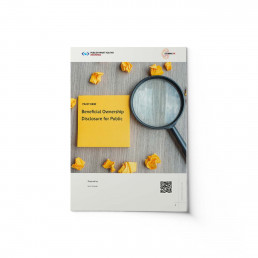The discussion on Beneficial Ownership disclosure has attracted the interest of the government, financial institutions, banks, and corporations as well. The disclosure of BO is expected to improve the investment climate by reducing financial risk for investors and creating a fair business climate at the same time. The practice of BO information disclosure to the public in some countries has shown a precedent in minimizing the risk of corporate misuse while encouraging crime prevention and financial crime management and corruption that can harm the corporation itself and the public, and the investment climate. For example, reporting on corruption and organized crime by a global network of independent media and journalists has contributed to the imposition of fines and confiscation of assets totalling more than USD 7.3 billion, as well as more than 500 arrests, charges, and convictions (Tymon Kiepe et al.: 2020).
In Indonesia, the disclosure of BO has a vital position, primarily to support a fair investment and business climate. One of them is creating a free market from financial misuse crimes, such as corruption, money laundering, and other organized crimes. In its development, the Government of Indonesia has agreed on several global commitments related to the BO information disclosure. As a member of the Asian Pacific Group on Money Laundering (APG), Indonesia has committed to implementing 40 FATF recommendations, particularly recommendation numbers 24 and 25 regarding BO for corporations and legal arrangements. In November 2014, Indonesia in the G20 Anti-Corruption Working Group (G20 ACWG) had committed to implementing the High-Level Principle on Beneficial Ownership and Transparency, which emphasizes the importance of transparency, availability of accurate and accessible BO information/data by authorized institutions. At the end of 2017, Indonesia hosted a Global Conference on BO, where the Indonesian Government restated its commitment to the disclosure of BO.
One of the efforts to mobilize a joint initiative among countries regarding the BO disclosure issue is through the Open Government Partnership (OGP) commitment. Indonesia has increased its commitment regarding access to BO information/data by including it as part of the OGP National Action Plan 2018-2020. The OGP National Action Plan regulated the provision and utilization of BO information/data through the corporation administration management system, the use of BO information/data to prevent misuse or criminal acts, and the use of BO information/data as a requirement for permit submission in the extractive and oil palm sectors. It shows that through the OGP National Action Plan, BO information/data disclosure has a vital position in the implementation of corporation administration, decision-making with a public dimension, i.e., permission, to the prevention of crime. Thus, the implication of the increasing importance of BO data for the public is necessary to strengthen public participation and accountability, such as encouraging the disclosure of BO information/data at various levels. By implementing BO information/data disclosure, the authorized or related agencies are expected to use it to support the implementation of their duties and functions. For the public, the BO data/ information disclosure is expected to improve the implementation of the public oversight function to support accountability for the management of public resources.
The policy paper aims to provide recommendations for the government in encouraging the BO data/ information disclosure through information exchange flow exchange among interested parties by existing regulations and the public. However, this policy paper is focused on the proposed arrangement of BO data/ information disclosure for the public. Since the BO data/ information disclosure for the public still faces various perspectives, particularly in finding a balance between the interest of fulfilling information disclosure to aspects of protection or prevention of potential impacts that may arise from the broad disclosure of information to the public.
